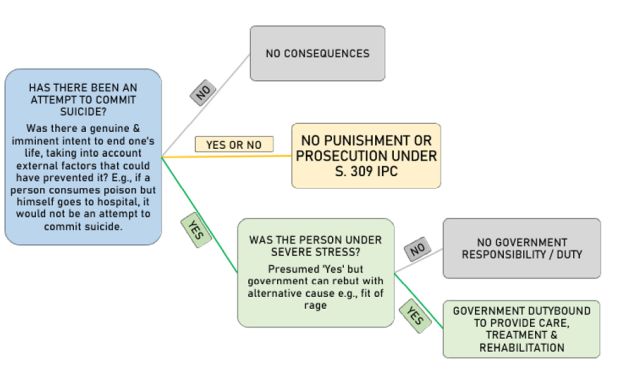Preferatory
In the realm of mental health legislation, the Mental Healthcare Act, 2017 stands as a pivotal milestone, aiming to reshape the understanding and treatment of mental illness within the framework of the law and with greater compassion. This analysis delves into the impact of the MHA on the prevailing legal perspectives concerning attempted suicide, punishable under s. 309 of the Indian Penal Code, 1870 ('IPC') and abetment of suicide, outlined by s. 306 of the IPC.
Background
India's mental health legislative trajectory, tracing back to the British colonial era of 1858, witnessed initial Acts centred on asylum-based care. The subsequent Mental Health Act, 1987 brought forth modern terminology and streamlined procedures, yet drew critique for prioritizing legal aspects over medical concerns. Responding to these shortcomings, the Mental Healthcare Bill, 2016, garnered unanimous approval from the Rajya Sabha, consequently transforming into the Mental Healthcare Act, 2017 ('MHA') on 07.04.2017, enforceable from 29.05.2018. The MHA's objectives encompassed providing mental healthcare and services, safeguarding, and advancing the rights of individuals with mental illness during their treatment, along with associated matters.
For a thorough grasp of the MHA's implications, it is imperative to gauge its essence against established global benchmarks. In 2005, the World Health Organization ('WHO') issued the comprehensive Resource Book ('WHO-RB') featuring a meticulous checklist of 175 essential aspects concerning mental health, human rights, and legislation, aimed at guiding national mental health policies. Despite subsequent milestones like the United Nations Convention on the Rights of Persons with Disabilities ('UNCRPD'), the WHO-RB remains a preeminent, structured framework for evaluating the human rights dimensions within mental health legislation.
Analytically, the MHA aligns with 55.4% of WHO-RB standards, escalating to 68% when considering supplementary legislation such as the Rights of Persons with Disabilities Act, 2016. Although heralded as a progressive stride, the MHA is not exempt from criticism, notably for certain provisions that employ ambiguous language, unintentionally restricting specific rights.
Relevant Provisions of the MHA
- S. 2(1)(s) of the MHA offers a more comprehensive definition of mental illness compared to the previous definition, encompassing substantial disorders affecting thinking, mood, perception, orientation, or memory, impairing judgment, behaviour, reality recognition, and the ability to manage daily life. It covers mental conditions associated with alcohol and drug abuse but excludes mental retardation, defined as an arrested or incomplete developmental state of mind, characterized by subnormal intelligence.
- S. 3 of the MHA outlines the process of determining mental illness, while ss. 18 to 28 establish fundamental rights for individuals with mental illness, including the right to live with dignity and without discrimination, the right to confidentiality, free treatment, and protection from inhumane and degrading treatment.
- Ss. 33 to 84 constitute the core of the MHA, conferring authority upon the government to establish the Central Mental Health Authority at the national level and State Mental Health Authorities in each State. These sections also regulate the functioning of these authorities, mental health establishments, and mental health review boards.
- S. 105 of the MHA addresses mental illness in legal proceedings, stipulating that if proof of mental illness is presented and contested during a judicial process, the court shall refer the matter to the relevant Board for further assessment. The Board, in turn, will examine the person alleged to have a mental illness, either directly or through a committee of experts, and submit its opinion to the court.
- S. 115(1) of the MHA, titled "Presumption of severe stress in case of attempt to commit suicide", states that notwithstanding the provisions of s. 309 of the IPC, an individual attempting suicide shall be presumed to be under severe stress. Such individuals shall not be prosecuted under the IPC unless proved otherwise.
- S. 116 of the MHA restricts civil courts from entertaining suits or proceedings related to matters within the authority of the MHA-governed bodies. It also prohibits the issuance of injunctions by any court or authority against actions taken or to be taken under the powers granted by the MHA.
- S. 120 of the MHA asserts the overarching supremacy of its provisions, stating that the MHA shall have an overriding effect notwithstanding anything inconsistent in any other prevailing law.
Has Attempt to Commit Suicide (S. 309 IPC) been Decriminalized?
S. 115(1) of the MHA introduces a distinctive framework concerning the act of attempting suicide, offering both a presumption and an exemption from prosecution. It establishes a rebuttable presumption wherein an individual who attempts to commit suicide is deemed, unless proved otherwise, to be experiencing severe stress. However, this presumption is limited to assessing the person's mental state and focuses solely on the presence of severe stress.

Significantly, when it comes to the exemption from prosecution and punishment, the provision stands as an autonomous and self-contained entity. The language of s. 115(1) of the MHA employs two separate mandates, each commencing with the term 'shall' – the first establishing the presumption of severe stress and the second indicating the exemption from prosecution. These clauses are distinct and operate independently from one another. The crucial distinction lies in the fact that the exemption from prosecution does not rest upon the presumption of severe stress. Therefore, an individual who attempts suicide is exempted from prosecution and punishment under s. 309 of IPC, regardless of whether the presumption of severe stress is substantiated or rebutted.
In light of this interpretation, it can be affirmed that the attempt to commit suicide under s. 309 of IPC has been effectively decriminalized. The structure of s. 115(1) of the MHA establishes a clear delineation between the presumption of severe stress and the exemption from prosecution, indicating that the exemption is not dependent on the presumption. Therefore, based on a comprehensive analysis of the provision, it can be stated that the attempt to commit suicide, as delineated under s. 309 of IPC, has indeed been decriminalized.
What is the Impact on the Offence of Abetment of Suicide (S. 306 IPC)?
MHA establishes a presumption that individuals attempting suicide are under severe stress at the time of their attempt. This presumption functions as a specific tool, akin to a legal fiction, established for a distinct purpose. The consequence of it is to place an obligation on the government to ensure care, treatment, and rehabilitation for such individuals, aligning with the presumption of 'severe stress.'
Importantly, the presumption of 'severe stress' within the MHA should logically extend to individuals who have died by suicide, aligning with its underlying purpose. However, this presumption does not inherently absolve someone accused of abetting suicide, as s. 115(1) of the MHA is primarily concerned with the classification of the mental state of the person who attempts suicide, rather than the culpability of others.
In the context of the offence of abetment of suicide under s. 306 of IPC, the MHA's s. 115(1) does not explicitly alter or amend the legal implications of abetment. This interpretation finds support in the Standing Committee Report on the Mental Health Care Bill, 2013, which acknowledges concerns regarding the offence of abetment of suicide under s. 306 IPC. However, the report does not propose any amendments or modifications pertaining to this issue.
Therefore, while s. 115(1) of the MHA establishes a presumption of 'severe stress' for individuals attempting suicide, it does not have a direct impact on the offence of abetment of suicide under s. 306 of IPC. The presumption is focused on the individual's mental state, while abetment continues to be governed by the existing legal framework of the IPC.
Conclusion
Although Aristotle argued that law should be driven by rationality rather than emotion, contemporary times have introduced legal frameworks that incorporate empathy. However, the application of empathy tends to be selective. There is no doubt that the enactment of MHA signifies a watershed moment in the legal understanding of mental health in India. It brings empathy and compassion to the forefront, aiming to create a holistic framework that aligns the nation's approach with global standards. It effectively decriminalized the act of attempting suicide, however, its direct impact on the offence of abetment of suicide remains circumscribed. This legal journey exemplifies the intricate interplay between evolving societal norms, legal reforms, and the continuous pursuit of empathy in the administration of justice.
Originally published 25 August 2023
The content of this article is intended to provide a general guide to the subject matter. Specialist advice should be sought about your specific circumstances.

